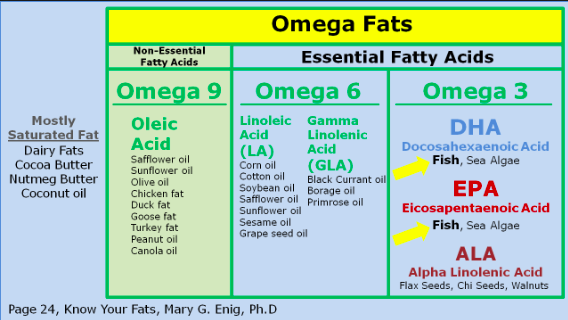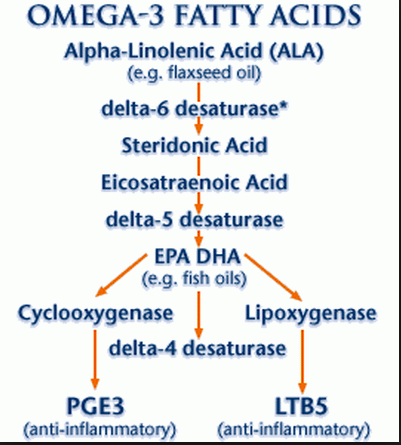Authored by Dr. Barrett
Eating a diet rich in omega-3 fatty acids can benefit your heart. Omega-3 fatty acids have shown promise for both prevention of cardiovascular events and treatment for people who are already having cardiovascular trouble. Historically, humans consumed roughly equal amounts of omega-6 and omega-3 fatty acids. In our modern diet we are consuming significantly higher amounts of omega-6 fatty acids. Approximately 20-30 times more omega-6 than omega-3! These fatty acids use a common enzyme which means that consuming more omega-6 will actually lower your tissue levels of omega-3.
Here is a helpful visual to better understand the food sources of omega-3 and omega-6 fats.
Eating a diet rich in omega-3 fatty acids can benefit your heart. Omega-3 fatty acids have shown promise for both prevention of cardiovascular events and treatment for people who are already having cardiovascular trouble. Historically, humans consumed roughly equal amounts of omega-6 and omega-3 fatty acids. In our modern diet we are consuming significantly higher amounts of omega-6 fatty acids. Approximately 20-30 times more omega-6 than omega-3! These fatty acids use a common enzyme which means that consuming more omega-6 will actually lower your tissue levels of omega-3.
Here is a helpful visual to better understand the food sources of omega-3 and omega-6 fats.
Both the American Heart Association and the World Health Organization recommend regular consumption of oily fish in addition to other sources of omega-3’s such as flaxseeds and walnuts. Several large population studies have shown that consuming omega-3’s, particularly from fish oil, can not only reduce the risk of cardiovascular disease but also reduces the risk of death from cardiovascular events.
Not all omega-3’s are created equal. ALA,the main omega-3 in flaxseeds, undergoes several steps to be converted in to DHA and EPA. Fish oil provides both EPA and DHA which is easier for the body to use.
Not all omega-3’s are created equal. ALA,the main omega-3 in flaxseeds, undergoes several steps to be converted in to DHA and EPA. Fish oil provides both EPA and DHA which is easier for the body to use.
When selecting fish to add to your diet you want cold water fatty fish. The best choices are Wild Alaskan Salmon, sardines and anchovies. If you aren’t able to get fish into your diet several times per week consider supplementing your diet with fish or cod liver oil.
When selecting a fish oil product make sure the company does independent testing on the oil for any contaminants such as mercury. You also want to see the amounts of EPA and DHA clearly indicated on the label. A good basic starting dose of fish oil is 1000mg of EPA and 750mg of DHA daily. For more personal recommendations please contact one of our naturopathic doctors.
If you would like more technical information about the benefit of omega-3 fatty acids in cardiovascular health please read my article published in the Journal of Alternative Therapies in Health and Medicine.
When selecting a fish oil product make sure the company does independent testing on the oil for any contaminants such as mercury. You also want to see the amounts of EPA and DHA clearly indicated on the label. A good basic starting dose of fish oil is 1000mg of EPA and 750mg of DHA daily. For more personal recommendations please contact one of our naturopathic doctors.
If you would like more technical information about the benefit of omega-3 fatty acids in cardiovascular health please read my article published in the Journal of Alternative Therapies in Health and Medicine.

Dr. Sara Jean Barrett is a licensed Naturopathic Doctor and co-founder of Wellness Minneapolis. She is also the Vice President of the Minnesota Association of Naturopathic Physicians and a Member of the American Association of Naturopathic Physicians. Click here to learn more about Dr. Barrett.



 RSS Feed
RSS Feed